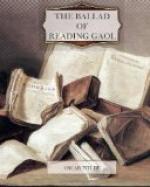II.
How strangely still! no sound of life or joy
Startles the air; no laughing shepherd-boy
Pipes on his reed, nor ever through the day
Comes the glad sound of children at their play:
O sad, and sweet, and silent! surely here
A man might dwell apart from troublous fear,
Watching the tide of seasons as they flow
From amorous Spring to Winter’s rain and snow,
And have no thought of sorrow;—here, indeed,
Are Lethe’s waters, and that fatal weed
Which makes a man forget his fatherland.
Ay! amid lotus-meadows dost thou stand,
Like Proserpine, with poppy-laden head,
Guarding the holy ashes of the dead.
For though thy brood of warrior sons hath ceased,
Thy noble dead are with thee!—they at least
Are faithful to thine honour:- guard them well,
O childless city! for a mighty spell,
To wake men’s hearts to dreams of things sublime,
Are the lone tombs where rest the Great of Time.
III.
Yon lonely pillar, rising on the plain,
Marks where the bravest knight of France was slain,—
The Prince of chivalry, the Lord of war,
Gaston de Foix: for some untimely star
Led him against thy city, and he fell,
As falls some forest-lion fighting well.
Taken from life while life and love were new,
He lies beneath God’s seamless veil of blue;
Tall lance-like reeds wave sadly o’er his head,
And oleanders bloom to deeper red,
Where his bright youth flowed crimson on the ground.
Look farther north unto that broken mound,—
There, prisoned now within a lordly tomb
Raised by a daughter’s hand, in lonely gloom,
Huge-limbed Theodoric, the Gothic king,
Sleeps after all his weary conquering.
Time hath not spared his ruin,—wind and
rain
Have broken down his stronghold; and again
We see that Death is mighty lord of all,
And king and clown to ashen dust must fall
Mighty indeed their glory! yet to me
Barbaric king, or knight of chivalry,
Or the great queen herself, were poor and vain,
Beside the grave where Dante rests from pain.
His gilded shrine lies open to the air;
And cunning sculptor’s hands have carven there
The calm white brow, as calm as earliest morn,
The eyes that flashed with passionate love and scorn,
The lips that sang of Heaven and of Hell,
The almond-face which Giotto drew so well,
The weary face of Dante;—to this day,
Here in his place of resting, far away
From Arno’s yellow waters, rushing down
Through the wide bridges of that fairy town,
Where the tall tower of Giotto seems to rise
A marble lily under sapphire skies!
Alas! my Dante! thou hast known the pain
Of meaner lives,—the exile’s galling
chain,
How steep the stairs within kings’ houses are,
And all the petty miseries which mar
Man’s nobler nature with the sense of wrong.
Yet this dull world is grateful for thy song;
Our nations do thee homage,—even she,
That cruel queen of vine-clad Tuscany,
Who bound with crown of thorns thy living brow,
Hath decked thine empty tomb with laurels now,
And begs in vain the ashes of her son.




